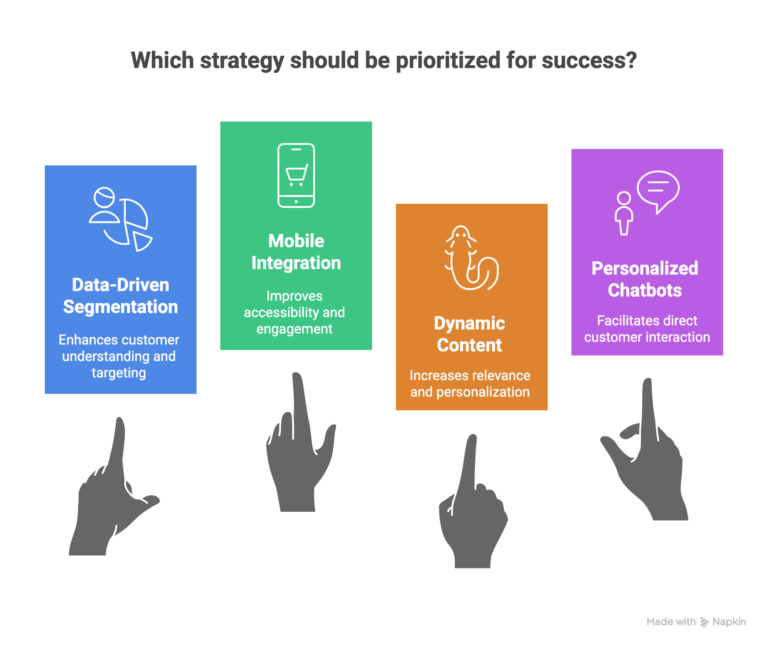Greetings! I'm Aneesh Sreedharan, CEO of 2Hats Logic Solutions. At 2Hats Logic Solutions, we are dedicated to providing technical expertise and resolving your concerns in the world of technology. Our blog page serves as a resource where we share insights and experiences, offering valuable perspectives on your queries.

Why do 6 out of 10 GCC shoppers abandon their carts on international e-commerce sites? The answer isn’t pricing or shipping, it’s personalization failure.
While global retailers pour millions into AI-powered recommendations, they’re missing a critical insight: Gulf consumers don’t just want personalized experiences, they demand culturally intelligent ones. A recommendation engine trained on Western shopping behaviors will never understand why a Saudi shopper browses differently during Ramadan, or why Emirati customers expect Arabic customer service even when browsing English product pages.
This is where AI personalization GCC strategies diverge from global playbooks. Success requires marrying cutting-edge technology with deep cultural localization, and the retailers getting this right are seeing 30-40% higher conversion rates than competitors.
Understanding the GCC E-Commerce
The GCC retail digital transformation has accelerated dramatically. The region’s e-commerce market, valued at approximately $50 billion in 2024, is projected to exceed $85 billion by 2028. Saudi Arabia’s e-commerce personalization initiatives lead this growth, with the Kingdom commanding over 50% of the GCC digital retail market.
Mobile commerce dominates entirely. In the UAE, smartphone usage during shopping journeys reaches 89%, while in Saudi Arabia, it follows at 85%. This mobile-first behavior demands responsive strategies that leverage AI-powered mobile commerce UAE technologies to deliver instant, context-aware experiences.
Gen Z and millennial consumers (ages 18-40) represent the primary demographic, characterized by high digital literacy, social media influence, and expectations for instantaneous, personalized service. These consumers seamlessly switch between online research, social commerce, and traditional retail, creating complex omnichannel journeys that demand sophisticated data-driven retail GCC approaches.
What Is AI Personalization?
AI personalization represents the sophisticated application of machine learning algorithms and predictive analytics to create individualized shopping experiences. Unlike rule-based customization, true Arabic e-commerce personalization leverages artificial intelligence to continuously learn from customer interactions, adapting recommendations in real-time.
At its core, AI analyzes browsing history, purchase patterns, demographic information, device preferences, and engagement metrics. These algorithms identify patterns invisible to human analysts, predicting what products or offers will resonate with specific customers.
In e-commerce contexts, customer experience personalization GCC manifests across several touchpoints: dynamic product recommendations based on collaborative filtering, AI-powered search that understands Arabic queries, customized homepage layouts, and personalized email campaigns. Gulf region AI retail trends show that properly implemented recommendation engines can increase average order values by 20-30%.
Pro-Tip: Start with recommendation engines before expanding to other personalization features. They typically deliver the fastest ROI and provide valuable data for broader initiatives.
The Power of Localization: Language, Culture & Context
Arabic localization e-commerce extends far beyond translation. The Arabic language presents unique challenges: right-to-left text orientation, multiple dialects across the GCC, and cultural nuances embedded in word choice. Cultural adaptation AI e-commerce must account for deeply held values, modesty in imagery, family-oriented messaging, respect for religious observances, and gender considerations.
Localization includes supporting regional payment preferences. While credit cards are common, cash-on-delivery remains popular. Local payment networks like Saudi Arabia’s mada, Bahrain’s Benefit, and Kuwait’s KNET must be integrated alongside international options.
The GCC commercial calendar revolves around distinct events: Ramadan (shifted shopping behaviors with evening purchase peaks), Eid celebrations (major shopping occasions), National Days (patriotic shopping events), and summer travel periods affecting product demand.
Warning: Ignoring cultural sensitivities can cause serious brand damage. Always involve local cultural consultants in content review before launching campaigns.
Research shows that 75% of GCC consumers prefer purchasing from websites in their native language, and 60% abandon sites with poor Arabic localization. The risks of neglecting personalized shopping GCC strategies include eroded trust, damaged brand perception, and significantly lower conversion rates.
Integrating AI with Arabic & Local Relevance
The intersection of artificial intelligence and Arabic language processing presents both opportunities and challenges. Arabic NLP has advanced significantly, enabling sophisticated understanding of Modern Standard Arabic and regional dialects.
AI-powered sentiment analysis can accurately interpret Arabic text nuances, understanding emotional tone and satisfaction levels. This enables automated customer feedback analysis and social media monitoring. Arabic chatbots have evolved to conversational AI that understands context, handles complex queries, and maintains natural dialogue flow.
Pro-Tip: Implement bilingual chatbots that detect language preference from the first message rather than forcing manual selection. This reduces friction and improves engagement rates by 40%.
WhatsApp Business API integration enables personalized shopping experiences through the region’s most popular messaging platform. Saudi Arabia and UAE consumers spend 3+ hours daily on WhatsApp, making it ideal for product discovery, customer service, and transactions. AI tools specifically trained on Arabic commerce content can generate product descriptions and marketing copy that sound natural rather than mechanically translated.
Voice commerce is growing with improved Arabic voice recognition, enabling voice search and voice-activated shopping. Visual search using AI-powered image recognition allows customers to search using photos, particularly valuable in fashion and home décor.
Key Strategies for Success
Implementing effective omnichannel personalization GCC strategies requires a structured approach that respects regional nuances.

Data-Driven Customer Segmentation: Move beyond demographics to behavioral segmentation based on shopping mission, cultural preferences, device behavior, price sensitivity, and engagement patterns. Leading platforms use machine learning to identify micro-segments that receive tailored experiences.
Mobile and Omnichannel Integration: Given the dominance of mobile commerce, implement Progressive Web Apps that deliver app-like experiences without downloads. Use cross-device identity resolution to track customers across devices, maintaining consistent personalization. For retailers with physical presence, connect online browsing with in-store experiences using geolocation-triggered offers.
Dynamic Content and Localized Recommendations: Personalization should adapt to time of day, day of week, seasonal changes, and cultural calendar events. Location-based adaptation customizes offerings by emirate or city, accounting for local availability, regional preferences, and dialect variations. Recommendation engines must balance global patterns with local preferences, ensuring culturally relevant suggestions.
Personalized Chatbots and Conversational Commerce: Use AI to identify moments when customers need assistance and initiate helpful conversations. Implement chatbots that recommend products based on qualifying questions, browsing history, and similar customer preferences. Enable purchases directly within messaging platforms while overcoming Implementation challenges and maintaining personalization throughout checkout.
Get in Touch
Ready to start your project?
Overcoming Implementation Challenges
GCC retailers face several barriers when implementing AI personalization. Consumer privacy regulations vary significantly; Saudi Arabia’s PDPL, the UAE’s data protection laws, and Qatar’s privacy frameworks impose different compliance requirements. Generic data collection strategies may expose businesses to legal risks.
Warning: Data sovereignty requirements in some GCC countries mandate customer data storage within national borders. Ensure your cloud architecture supports compliance.
Data quality challenges include fragmented customer data across channels, inconsistent Arabic data formatting, and limited historical data for new market entrants. Address these through robust customer data platforms that unify touchpoints and implement data cleaning protocols.
Technical infrastructure gaps and AI talent shortages remain obstacles. Partner with specialized vendors experienced in Gulf region AI retail trends, invest in training programs, and consider hybrid approaches that combine local expertise with global technology platforms.
Future Trends in GCC E-Commerce Personalization
Generative AI will revolutionize content creation, enabling real-time generation of Arabic product descriptions, personalized marketing messages, and dynamic visual content respecting cultural values. Hyperlocal marketing will leverage micro-location data to deliver neighborhood-specific offers and ultra-fast delivery options.
Voice commerce will expand as Arabic language models improve, with smart home devices enabling seamless shopping experiences. Augmented reality will allow virtual product trials, particularly valuable for fashion, furniture, and cosmetics, where physical inspection traditionally influenced purchases.
Autonomous shopping experiences using predictive AI will anticipate needs before customers express them, automatically reordering essentials and suggesting products based on life events, seasonal needs, and personal milestones.
Conclusion
The GCC e-commerce landscape demands a sophisticated approach combining cutting-edge AI personalization with deep cultural understanding. Success requires mobile-first design, authentic Arabic localization, respect for cultural values, and data-driven personalization that continuously learns and adapts.
Start with high-impact, manageable implementations like recommendation engines and Arabic chatbots. Invest in robust customer data platforms that unify touchpoints while respecting privacy regulations. Partner with local experts who understand cultural nuances alongside technology capabilities.
The retailers thriving in data-driven retail GCC markets are those who view personalization not as a technical feature but as a cultural bridge, leveraging AI to deliver experiences that feel authentically local while meeting global standards for convenience and sophistication.
Weekly Insights
Get our best content delivered to your inbox every week.
FAQ
What's the difference between personalization and localization in GCC e-commerce?
Personalization tailors experiences to individual customer behaviors and preferences using AI. Localization adapts content, language, and offerings to regional culture, language (Arabic), and market characteristics. Both are essential for GCC success.
Which GCC market offers the best opportunities for personalized e-commerce?
Saudi Arabia leads in market size (50%+ of GCC e-commerce), the UAE excels in digital adoption and innovation acceptance, while Qatar and Bahrain offer affluent, concentrated markets. Each requires tailored strategies.
Can small GCC retailers compete with AI personalization against major platforms?
Yes. Start with affordable tools like WhatsApp Business API, implement basic recommendation plugins, and focus on superior cultural understanding and customer service that larger platforms may overlook.

Related Articles








